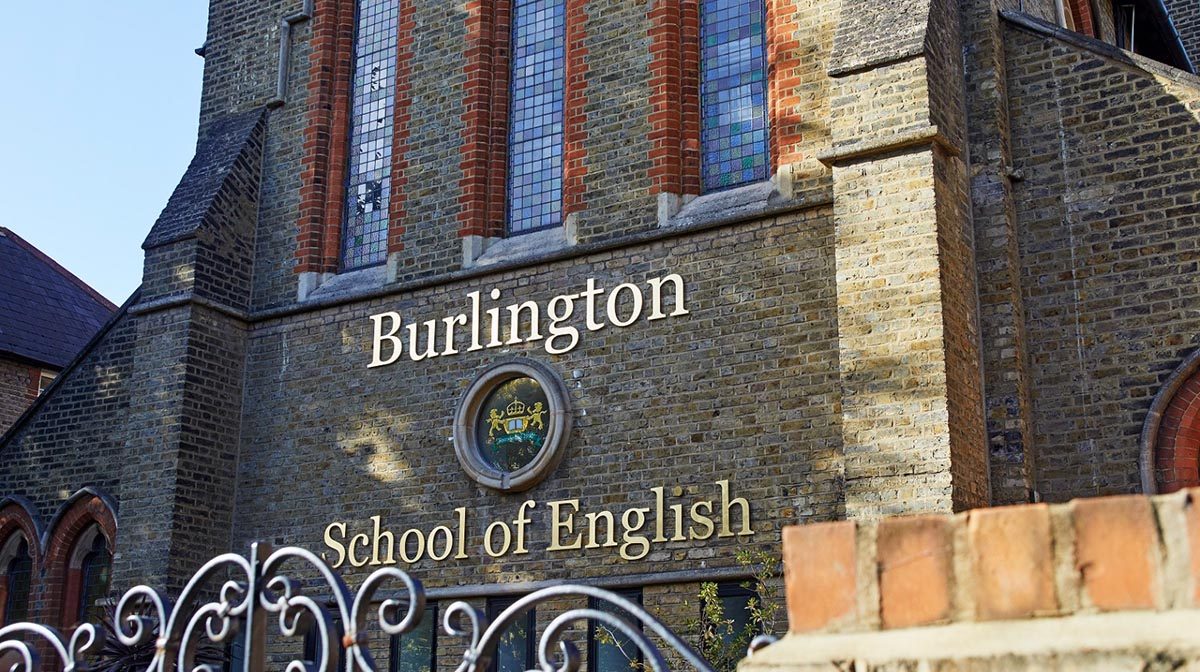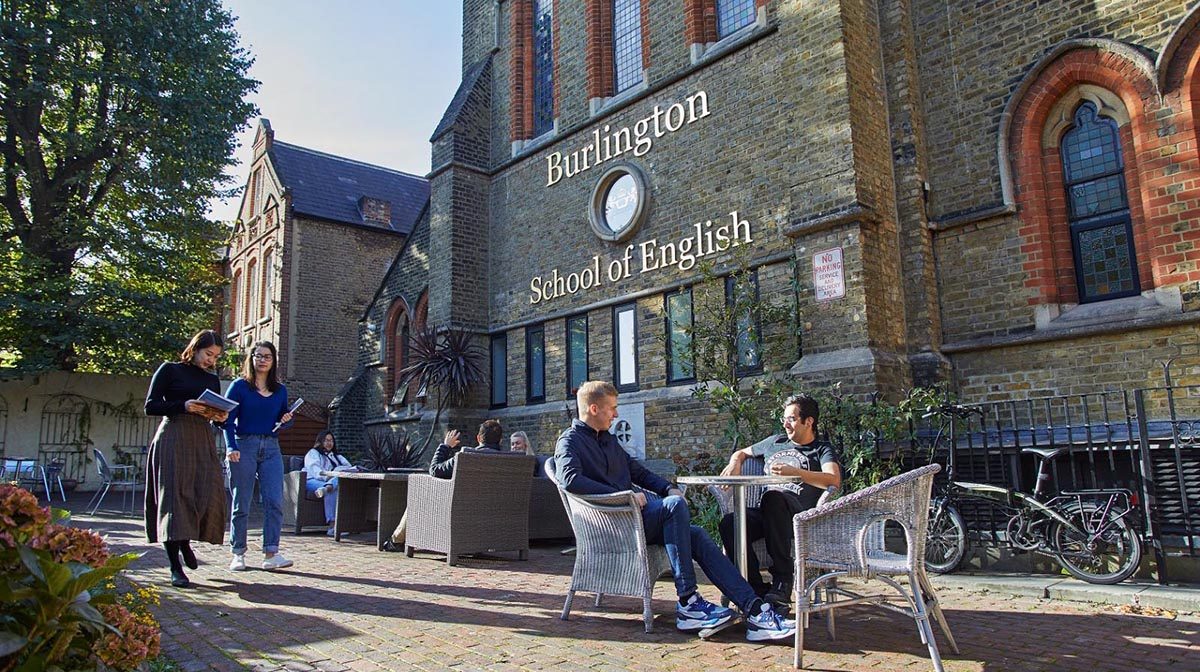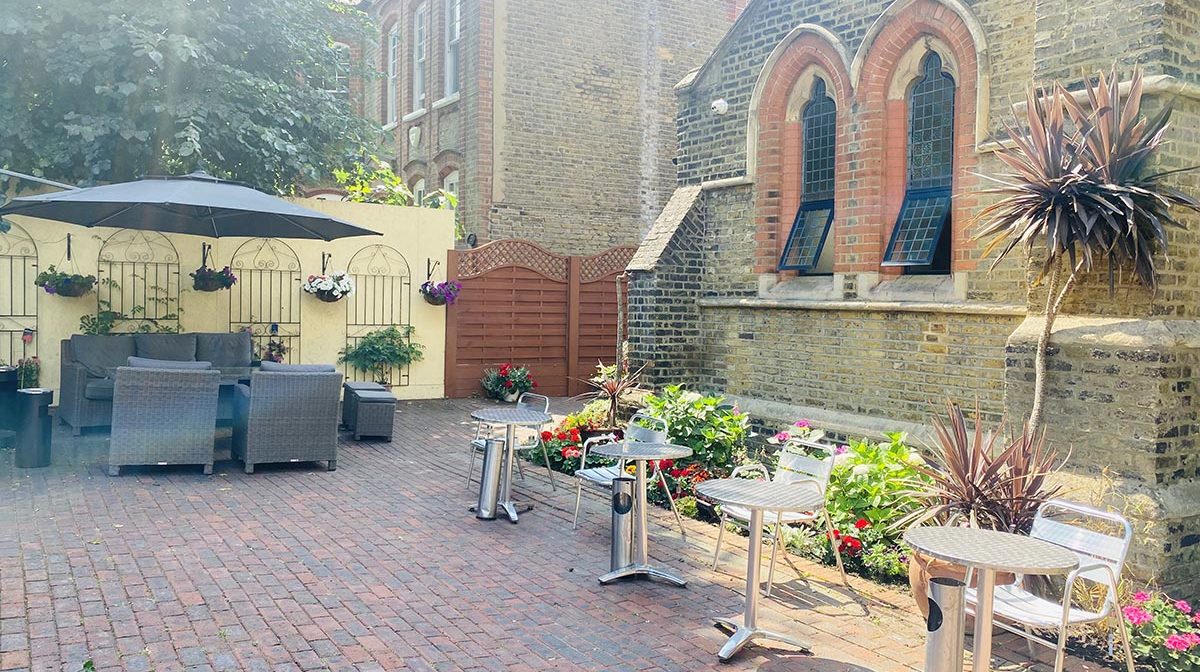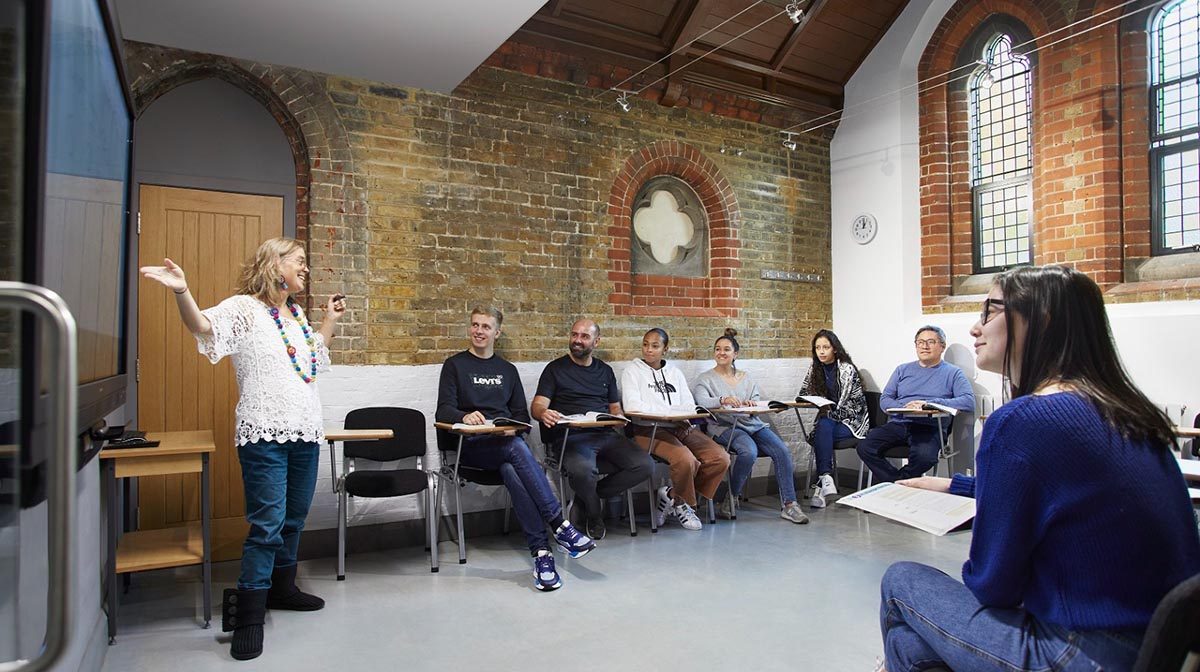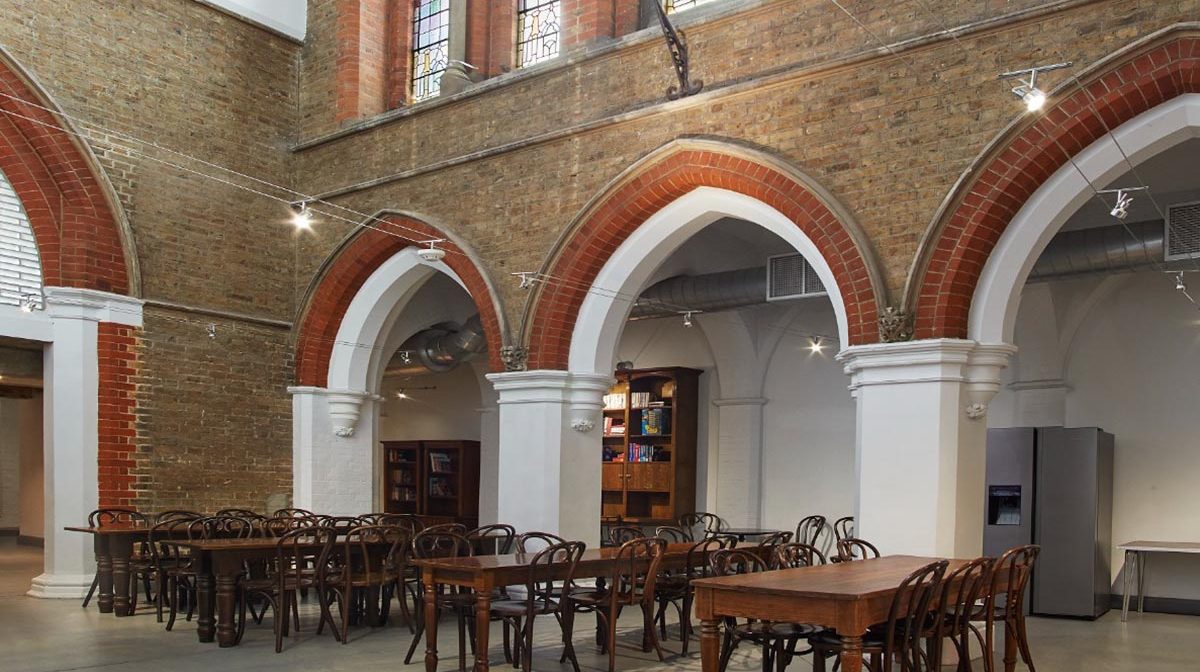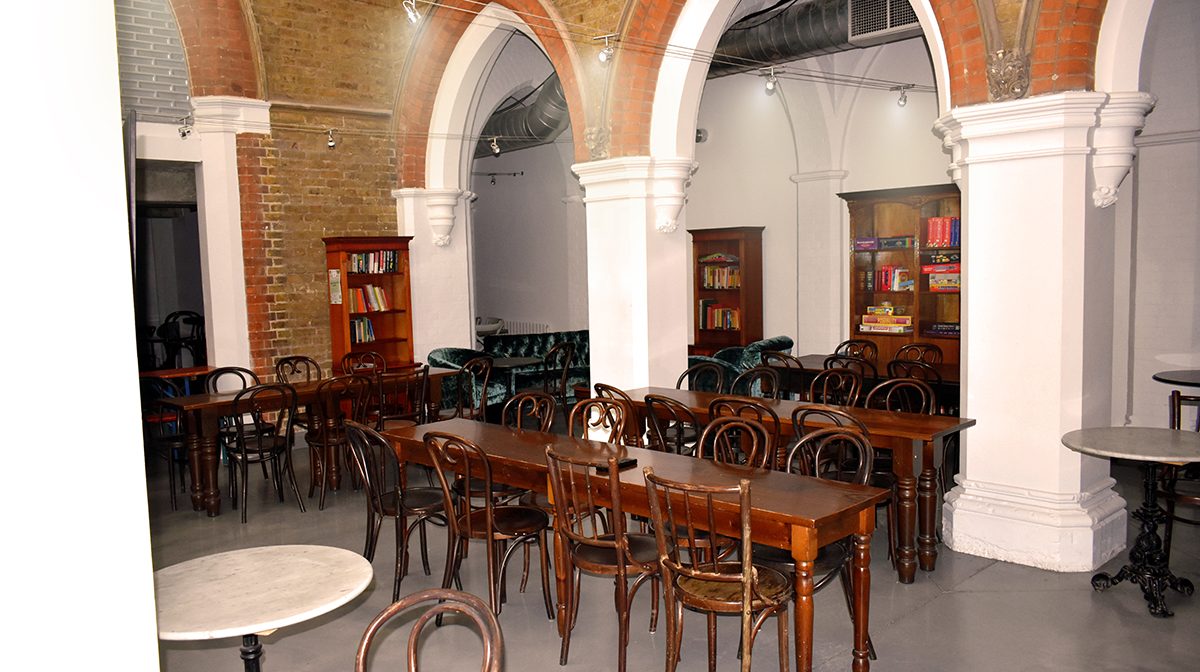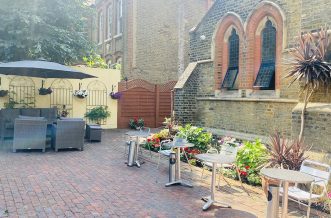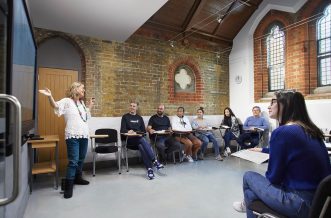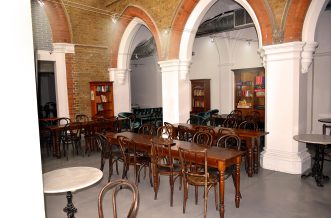Burlington School of English
- The Burlington School of English in London was founded in 1990 and aim to provide quality and innovative English language courses. Burlington's curriculum incorporates a communicative and holistic approach with cultural immersion in the customs and language of the United Kingdom. They are here to serve the needs of learners whose first language is not English, helping them to improve their English language abilities and to be successful in pursuit of their academic, business and personal goals.

Why choose Burlington?
Since 1990, we have helped students from around the globe become more confident communicators in English, the Burlington School of English has become one of the leading independent language schools in London.
We are proud of our reputation for excellence in our academic programmes for Adults and Young Learners, personalised customer service support, and our family-oriented atmosphere – and we are delighted to have expanded to a brand-new school site.
Our new multi-million pound centre, with interactive classroom technology and over 80 on-site residential beds, is in a popular and well-connected South London neighbourhood which offers excellent transport links and green space in a local community that our students love.
We offer the full package: a community space to eat, sleep, socialise and study – all under one roof. You can learn English through authentic interaction with the diverse population of Londoners and a range of vibrant local businesses.
2025: General English, IELTS Test Preparation, Cambridge Exam Preparation
| Number of weeks | Standard Course Main Session +1 Workshop 15hrs per week |
Intensive Course Main Session +3 Workshops 22hrs 30min per week |
|---|---|---|
| 1-4 weeks | £295pw | £375pw |
| 5-11 weeks | £275pw | £355pw |
| 12-23 weeks | £255pw | £335pw |
| 24-35 weeks | £235pw | £315pw |
| 36+ weeks | £215pw | £295pw |
Specialist Courses £600
Includes:
- 20 General English/IELTS Test Preparation/Cambridge Exam Preparation lessons per week.
- 5 x one hour mini-course.
- Flexible and tailored one-to-one or small group tuition according to your specific needs.
- Our academic management team design a course in consultation with you.
General English
Half Day Standard:
This English language course focuses on the four language skills: reading, writing, speaking and listening. In this class, you will practise your English a lot, interact with others and have fun.
Full Day Intensive:
This General English course is made up of two GE15 sessions totalling six 45-minute lessons a day. It starts at 9am and finishes at 4:30pm with a break between 11:30am and 2pm.
Evening English:
This course is designed for those who wish to improve their English abilities while having all-day activities such as studies or work. The syllabus is focused on improving the four language skills: speaking, reading, writing and listening.
English Language for Teachers
The course combines 15 lessons of General English to increase your language skills depending on your level, plus five lessons of one-to-one tuition, focused on improving your skills in teaching English as a Foreign Language.
Students will improve their own language skills and study different approaches and theories in English as a Foreign Language (EFL) learning and teaching, and practical suggestions for the classroom. The course includes a detailed needs analysis of each student and then covers topics including English phonology, grammar, improving classroom dynamics, using technology in the classroom and utilising authentic materials.
Medical English
The course combines 15 lessons of General English to increase your language skills depending on your level and five lessons of one-to-one tuition focused on improving your command of the specialist terminology used in the English-speaking medical community.
The syllabus is negotiated with the student to allow the course to be tailored to meet individual student needs. The course focuses on developing presentation skills, as well as reading medical texts and writing reports. This course is a popular option for students seeking English instruction to support their future career objectives.
English for Academic Purposes
This course is usually taken by those who wish to pursue their studies in a British university. The programme combines General English courses and modules with a focus on academic English.
You will study 15 lessons per week of General English and five lessons of specialised university preparation and you will be expected to spend considerable extra time on research and homework tasks.
The one-to-one classes are particularly intensive and are a popular option for those who are ready to work hard to support their academic objectives.
The course will allow you to learn about first-year academic programmes at British universities and develop your academic and self-directed study techniques. You will also upgrade your language skills to a level of proficiency that will enable you to participate effectively in undergraduate studies in the UK.
The course includes:
- English language training,
- Cross-cultural studies,
- Learner training,
- is made up of three 12-week modules which increase in complexity.
- You will also spend time preparing for the IELTS exam for entry into a British university.
Cultural Studies
The course combines 15 lessons of General English to increase your language skills, depending on your level, and five lessons of one-to-one tuition focused on deepening your understanding of British history and culture while studying the language. You will develop your language skills through the study of subjects in which you have a particular interest while gaining an understanding of the social, cultural and historical context of the English language.
This English language course consists of three modules:
Life and Literature:
A study of major British authors, dramatists and poets, from Shakespeare to the modern age.
Taking Issue:
You will gain a deeper understanding of social and political issues that shape modern Britain, including the monarchy, relations with Europe and Northern Ireland.
Britain Now:
You will study works of modern British writers such as Dylan Thomas and Philip Larkin, as well as films and songwriters from the seventies to modern times. This is an exciting opportunity to examine and debate the content and themes of these works and what they reveal about British people.
General Business English
If you are planning to work in a company where English is the main language, this course is for you! The lessons focus on acquiring general business English vocabulary and language skills in an office environment.
The course combines 15 lessons of General English, to increase your language skills depending on your level, and five lessons in smaller groups or on a one-to-one basis.
These lessons focus on increasing business English capabilities by practising with your dedicated teacher how to handle different situations where business English is used, such as in interviews, meetings, presentations and phone calls.
Tourism Industry English
This is one of the fastest-growing service sectors in the world. If you are planning to work in the tourism and travel industry, then this course is for you!
The course combines 15 lessons of General English, to increase your language skills depending on your level, and five lessons in smaller groups or on a one-to-one basis. These smaller group lessons in the second part of the day allow you to focus on language relevant to the field, and to familiarise yourself with some relevant aspects of the travel industry.
You and your teacher will focus on acquiring vocabulary relevant to your field by using case studies and interacting with you on specific topics – this gives you the opportunity to practise using language in this field.
Choosing London as a location to learn Tourism Industry English is strategic if you are looking for job opportunities in a city which is often the most popular tourist destination in the world.
Marketing English
This course is for students who wish to pursue a career in marketing, an area of business that needs individuals who are effective and persuasive.
The course combines 15 lessons of general English, to increase your language skills depending on your level, and five lessons in smaller groups or on a one-to-one basis with an experienced teacher, who will be focused on your improvement and achievements throughout the course. These smaller group lessons in the second part of the day allow you to focus on the language relevant to the field.
General office English
On this course, you will acquire English language skills as used in a typical English-speaking office environment.
The course combines 15 lessons of General English, to increase your language skills depending on your level, and five lessons in smaller groups or on a one-to-one basis. During these smaller group lessons a particular focus is placed on everyday interactions in multinational office settings where English is the primary language of business.
The teacher simulates office environments and the most effective methods for communication in written and oral form in a variety of situations.
Import/Export English
This course covers typical communication challenges facing trading companies who deal with western companies, suppliers and trading partners in English.
The course combines 15 lessons of General English, to increase your language skills depending on your level, and five lessons in smaller groups or on a one-to-one basis. During these smaller group lessons a particular focus is placed on every-day interactions.
You will learn a lot of vocabulary and phrases related to your field and practise your English in order to enhance your language skills in this particular field.
IELTS
The International English Language Testing System (IELTS) is an international standardised test of English language proficiency recognised by most institutions in English-speaking countries and many employers. Also, those who would like to go to Canada and New Zealand need an IELTS qualification.
Therefore, taking the test will allow you to open new perspectives, whether you wish to pursue your studies in an English-speaking country or work and live in these countries. IELTS also offers you recognition of your English language skills if you need this in your home country.
At the end of the test, a Test Report Form is issued to all candidates with a score from “band 1″ (“non-user”) to “band 9″ (“expert user”) and each institution sets a different threshold. There is also a “band 0″ score for those who did not attempt the test.
Preparation Course:
The Burlington School offer two types of IELTS preparation courses depending on your level:
IELTS Intermediate:
This is an introduction to the IELTS exam. You will have a lot of exam practice, and a chance to improve your listening, speaking, reading and writing skills. To join this course, you need to be at Upper-Intermediate level or above (B2 level of CEFR in English).
IELTS Advanced.
This is an extension of the IELTS Intermediate course and is designed for those who have advanced level English or above (C1 level of CEFR in English). It is a more in-depth look at the necessary skills for the exam than the introductory IELTS course.
Cambridge English: Advanced (CAE)
The demand for high-level English language skills is increasing all around the world. Passing the Cambridge English: Advanced exam (CAE) shows that you are a high achiever.
This exam is set at Level C1 of the Common European Framework of Reference for Languages (CEFR). The exam consists of 5 equally-weighted papers:
- Paper 1 – Reading
- Paper 2 – Writing
- Paper 3 – Use of English (Grammar & Vocabulary)
- Paper 4 – Listening
- Paper 5 – Speaking
Advantages of studying for the CAE include the fact that it:
- Is accepted globally as proof of high achievement
More than 3,000 educational institutions, businesses and government departments around the world accept the Cambridge English: Advanced (CAE) as proof of high-level achievement. - is a certificate with many opportunities
- It helps you develop the language skills you need for success, and can be used for your university and student visa applications in the UK and Australia.
- provides high-level English skills for academic and professional success
Preparing for the Cambridge English: Advanced (CAE) helps learners develop the skills to make the most of studying, working and living in English speaking countries.
- Is a level of English for demanding study and work environments
Cambridge English: Advanced (CAE) shows that a student has the language ability to carry out complex research, communicate effectively at a professional level – and stand out from the crowd.
- Proves your real-life English language skills
Cambridge English: Advanced (CAE) offers proof of the English skills that educational institutions and employers seek for high-achieving study and work situations.
Cambridge English: First (FCE)
The Cambridge English: First (FCE) exam is an upper-intermediate level qualification. It proves you can use every day written and spoken English for work or study purposes.
Every year, thousands of people who want to use English to improve their work and study prospects take the FCE exam and they can use it to help them study in English at foundation or pathway level. The exam uses real-life situations that are specially designed to help you communicate more effectively and learn the language skills you need to take the next step to success.
This exam is accepted as a qualification in upper-intermediate English by many leading businesses and educational institutions around the world. The FCE exam is set at Level B2 of the Common European Framework of Reference for Languages (CEFR). Reaching this level means you can understand the main ideas of complex pieces of writing, keep up a conversation on a fairly wide range of topics, express opinions and present arguments and produce clear, detailed writing, expressing opinions and explaining the advantages and disadvantages of different points of view.
Cambridge English: Proficiency (CPE)
The Cambridge English: Proficiency (CPE) is the most advanced General English exam provided by Cambridge University. It proves that the level of those who passed the CPE is similar to educated native speakers of English, graded at C2 of the Common European Framework of Reference for Languages (CEFR).
The exam is designed for those who want to study or work and live abroad in an English-speaking country or in an environment that requires high proficiency in the English language.
The exam includes four parts:
- Reading & Use of English (1 hour and 30 minutes),
- Writing (1 hour and 30 minutes);
- Listening (approx. 40 minutes);
- Speaking (approx. 16 minutes).
Advantages of taking the Cambridge English Proficiency:
- Gain exceptional English language skills during your preparation for the exam;
- Prove your proficiency in the English language;
- The test is recognised by many international organisations, especially businesses.
TOEFL & TOEIC
Both the TOEFL and the TOEIC measure your English language proficiency. The difference between the two is not their level of difficulty but their purpose. While the TOEFL covers academic issues, the TOEIC includes business related topics.
About TOEFL
The Test of English as a Foreign Language (TOEFL) measures your ability to use the English language in university and college settings. This examination is designed for those who wish to prove their English language abilities to institutions, especially students who would like to study at university level in English-speaking countries.
Many government agencies, licensing bodies and universities outside the UK require a certain TOEFL score. More than 8,500 colleges, agencies and other institutions in 130 countries accept TOEFL scores.
The test takes four hours in total and covers the four basic language skills – reading, writing, listening and speaking, while some exercises require integrating multiple skills. All tasks focus on the English language used in an academic environment.
About TOEIC
The Test of English for International Communication (TOEIC) is an English language test designed specifically to measure the everyday English skills of people working in an international environment.
This exam is used by employers worldwide to determine who – among non-native English speakers – can communicate effectively in English. Over 10,000 organisations in 120 countries use this examination to decide which candidate has the appropriate English language skills to succeed in the global work place.
There are two types of TOEIC tests: a listening and reading test and a speaking and writing test. Each examination takes two hours and assesses the four language skills in an international business environment.
What they say...
“We have been working with London Homestays for over 5 years. With their support, we have managed to achieve a high level of customer satisfaction. We strongly recommend London Homestays to anyone who’s looking for quality, reliability and exceptional customer service.”
Alex Fernandes, Accommodation & Visa Compliance Manager, Malvern House London“Having worked with them since 2013, I can state that London Homestays have always taken care to match our students with suitable host families. They have a very friendly yet professional approach to their work. Our students have enjoyed staying at their homestays. Overall, students say that their host families are attentive and welcoming.”
Carl Roberton, Principal, Stafford House School of English“We at Burlington School have worked with London Homestays since 2014, and I professionally know the team since 2009 when I worked for another company in the education and accommodation industry. Having had the opportunity to work with London Homestays since the company started operations in London, all of the enquiries have been dealt with in a dedicated and timely manner, the team members are customer-oriented and always provide an exceptional accommodation experience to our students. I have no hesitation to recommend London Homestays as excellent accommodation providers and business partners.”
Eliane Tomasi, Accommodation & Welfare Officer, Burlington School“LSC Stanton has been working with London Homestays since 2011 and we are very pleased with the quality of accommodation and service they give to us. We have a good relationship with the team and they are always on hand to deal with any last-minute requests.”
Nick Bray, Managing Director, London Study Centre“Cooperation with London Homestays is always great! We highly appreciate proactive approach and effort to ensure the best possible services for our groups. We always had a great clean accommodation, friendly family and smart local organisers. Students of our groups were satisfied and they enjoyed staying in London very much. We would like to recommend this agency. The whole team is very kind.”
Miroslava Foltýnová, Owner, CK Bus Tours“We offer internships in London to European students and looked for a reliable partner to provide accommodation to our candidates. We have been very happy with the services provided by London Homestays, as have our candidates, as they have always received quickly information on families, the possibility to book a room in a short delay and also a good quality of families. I would recommend without any doubt this agency. The team is very professional, efficient and friendly :). We hope to send new trainees soon!”
Stéphanie Frassanito, Program Manager, Work Overseas“Our school from the Czech Republic has had great experiences with London Homestays. They are one of the only hosting agencies who would accept our very young guests (under 12). The host families were generally welcoming, kind, and accommodating. The service provided by the coordinator Kate O’Connor and other admin staff is second to none.”
Kate Powers, Vice Principal for English Studies, Sunny Canadian International SchoolMy homestay host Debra transformed my stay into the most amazing experience of my whole life!
Florian, student from Belgium: Homestay booking in Zone 3It was an amazing experience, I’ve found a new home where I feel as comfortable as I do in my own home!
Laura, student from France: Homestay booking in Zone 2I felt completely at ease and very comfortable with my host! She was really kind…many thanks!
Doris, student from Italy: Superior homestay in Zone 2Shanghai Chelsea International Consulting (SCIC) has worked with Home from Home many times and they have provided a very professional service.
Chan Sen, Director at Shanghai Chelsea International Consulting

